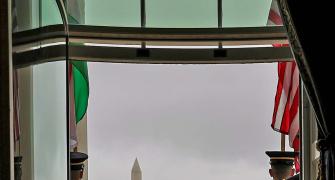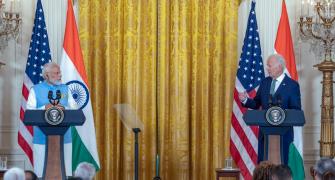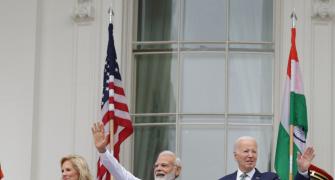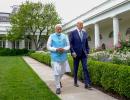The change of heart in the US and India was propelled by the increased threat of China to both countries, explains Ambassador T P Sreenivasan.

Old America hands among diplomats and journalists were lost for words when they were called upon to describe President Narendra Modi's recent visit to the United States, which was rich in symbolism and substance.
Most of the appropriate words were taken in 1997 when President Clinton launched an India charm offensive, in 2000, when he and Prime Minister Atal Bihari Vajpayee exchanged visits to New Delhi and Washington, in 2000, when the nuclear deal was initiated at the time of President Bush, in 2009, When Prime Minister Manmohan Singh went on an 'official State visit' to Washington and in 2016 when Prime Minister Modi addressed a Joint Session of the US Congress and announced a new symphony in India-US relations.
Between these epoch making events, there were periods when harsh words were used and unfriendly actions were taken by both sides for one reason or another.
Since Prime Minister Modi's recent visit was even more significant than the previous ones, words like 'only official State visit', 'historic visit', 'the defining relationship of the 21st century' and 'opening of a new chapter' were repeated by both sides, revealing the deficiency of superlatives in the English language.
But it was clear that the visit of 2023 was unique for its surprise, for the dramatic change of policy on both sides and its significance as marking the early beginnings of a new world order.
Barely a few months before the visit, the US was aghast that India did not condemn Russia when it invaded Ukraine and busted Western sanctions against Russia by buying oil and fertilisers from Russia.
India was equally astonished that the US at the highest level questioned human rights violations in India and wondered whether India was a democracy at all!
The US was concerned that India was not willing to convert the Quad into a military alliance even after India became a close defence partner by signing seminal agreements on defence cooperation.
But with the announcement of the visit in June 2023, concessions started pouring in from both sides, as though everything was forgiven and forgotten and 'another new chapter' in relations came into view.
Even with short memories, deja vu could not be missed.
For over thirty years, the US had maintained sanctions against India for not signing the Nuclear Non-Proliferation Treaty and President Clinton came down on India like a ton of bricks with unprecedented force when India tested nuclear weapons in 1998.
In 2005, it was willing to characterise India as a responsible technologically advanced State and to resume nuclear cooperation.
History repeated itself when the US offered defence technology to India, specially reserved for military allies.
India, faced with an uncertain security paradigm and the decline in suitable military supplies from Russia, happily accepted the offer. The offer was as courageous as its acceptance.

The enormity of the change can be gauged only after the necessary documentation is finalised and Congressional sanctions are obtained where necessary.
But the intention on both sides to strengthen technology based defence cooperation itself is historic enough to alter the power equations in the world.
The most important of the deals is considered to be the manufacture of GE 414 engine for the LCA MC 2 aircraft, followed by space cooperation, including human flights by signing the Artemis Accords.
No less important is the agreement to set up semiconductor manufacturing facilities in India.
The mutual confidence has been enhanced by the agreement to appoint liaison officers in each other's military organisations.
Visa concessions and expanding the consulate network were the icing on the cake.
The two sides agreed to disagree on the Russia-Ukraine war, but that did not cast a shadow on the visit.
In fact, President Biden had appreciated the role of India in shaping a consensus in the Bali Summit of G20.
Similarly, the US government largely ignored the campaign against the treatment of minorities and lack of freedom, although Prime Minister Modi was felt compelled to stress the Constitutional provisions for equality, liberty and fraternity in India.
Former President Obama, however, issued a statement cautioning India about possible breakup of the country if its Muslim minority was illtreated.
That was the most unkindest cut of all as he was the architect of the Indo-Pacific.

Clearly, the change of heart in the US and India was propelled by the increased threat of China to both countries.
The Chinese factor was prominent even on the other occasions, but the China-Russia Treaty of 2022 and the apparent agreement between them that each will support the other on matters of crucial interest to them like Ukraine and Taiwan aggravated the situation.
The balloon incident and the lack of progress in normalising relations even after Secretary of State Antony J Blinken's visit to China made the US aware of the looming threat from China.
It was only natural that the US thought of getting closer to India, regardless of India's reluctance to form an alliance.
India too was frustrated that the situation on the Line of Actual Control had not stabilised.
Moreover, China has discarded every agreement that was built over the years to lay a basis for peace and tranquillity on the border region.
The mutuality of interests between India and the US has not been as evident as now.

Will this 'new chapter' be as transient as the previous ones?
Will the agreements arrived last beyond a few months before another crisis set India and the US apart?
Will China realise that it might be in its best interest not to allow the present bonhomie between India and the US to continue?
The answer lies in the judgment whether the two countries see the present arrangements as part of a new world order emerging in the aftermath of the calamitous events of the 21st century.
It will also depend on how the other major global players react to the emerging other AI, 'America-India'.
President Biden and Prime Minister Modi conveyed a clear message that the political AI developing between them will be more benign and beneficial than the technological AI, which is being perceived as a risky proposition.
Ambassador T P Sreenivasan, who served as deputy chief of mission at India's embassy in Washington, DC at the time of India's nuclear tests in 1998, is a frequent contributor to Rediff.com.
You can read his earlier columns here.
Feature Presentation: Aslam Hunani/Rediff.com









